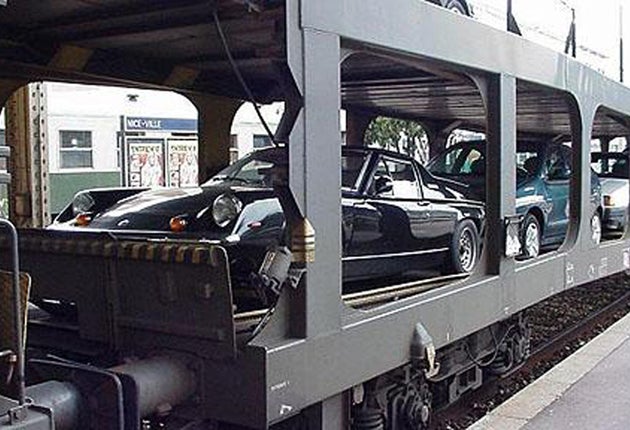End of the line for Motorail, gateway to the Mediterranean
Car-carrying night train service abandoned due to slump in sterling

Your support helps us to tell the story
From reproductive rights to climate change to Big Tech, The Independent is on the ground when the story is developing. Whether it's investigating the financials of Elon Musk's pro-Trump PAC or producing our latest documentary, 'The A Word', which shines a light on the American women fighting for reproductive rights, we know how important it is to parse out the facts from the messaging.
At such a critical moment in US history, we need reporters on the ground. Your donation allows us to keep sending journalists to speak to both sides of the story.
The Independent is trusted by Americans across the entire political spectrum. And unlike many other quality news outlets, we choose not to lock Americans out of our reporting and analysis with paywalls. We believe quality journalism should be available to everyone, paid for by those who can afford it.
Your support makes all the difference.Dinner in Calais, breakfast in Nice, car in tow: that has long been the summer regime for patrons of Motorail, the car-carrying night train through France. After a short Channel crossing, they could put their cars on a train at Calais, take their places in a couchette compartment, and sleep all the way to the Mediterranean.
No longer. The French rail service which whisks cars to the Mediterranean – and has been praised as a model for “greener” holidays – is to be abandoned after more than four decades because of the slump in sterling.
For a generation, British motorists have been able to save around 1,500 miles of driving on a round trip by using Motorail. The service has run since 1983, and this year carried around 10,000 UK travellers. For the last nine years it has been operated by Rail Europe, the British subsidiary of French Railways, specifically for UK motorists. They could choose between routes from Calais to Toulouse and Narbonne in south-west France, and to St-Raphael and Nice on the Cote d’Azur.
Rail Europe carried a forlorn little statement on its website yesterday. “French Motorail service from Calais to the South of France will sadly not be running in Summer 2010. The impact of the current economic climate and significant increases in train running costs, partly due to unfavourable exchange rates, means the service would not be financially viable.”
In truth, the service had been declining for years. Politicians and railway advocates argue that sending long-haul, holiday-bound cars by train could make an important contribution to the reduction of carbon emissions. Railway officials say that the proliferation of cheap air flights to small provincial airports in France has shunted the commercial justification for French Motorail into a siding.
“It is now much cheaper for a family to fly to the south of France on a cut-price airline and rent a car when they get there,” said a French railway official last night. “The Motorail service needed new investment but no one was prepared to take that risk at this time.”
Robert Chesshyre, a British journalist who has used the trains for many years, wrote an article last summer complaining that the stock was rundown and the windows so clouded that it was impossible to see the French countryside.
“It used to be an enormous pleasure to board one of these trains in Calais, dine in the restaurant car and wake up in the morning beside the Mediterranean. Of course the restaurant car went years ago,” he said.
“I don’t accept the argument that there is no longer a commercial demand. You can’t come home with a car-boot full of French wine if you take a cheap flight. There must be a case for starting new Motorail trains from England once Eurostar’s monopoly on passenger travel through the Channel tunnel expires.”
At one point, in the 1980s, the French railways, the SNCF, carried 40,000 British cars and over 100,000 passengers a year, on services from both Calais and Boulogne.
Rail Europe suggests that British tourists should switch to the French domestic service, AutoTrain. This offers car-carrying trains all year around to 12 destinations in France, but all the services begin in central Paris.
In April of this year, Jean Bernardi, a former French railway official who once ran French Motorail, appealed to the European Union to create a subsidised Motorail European Network to carry cars between major European cities. In an article in Rail Professional magazine, he said: “One Motorail train carrying 100 cars overnight for 1000 kilometres (600 miles) would save 16 tonnes of carbon.”
The problem was, he said, that railway companies in Europe – both privatised and state-owned – refused to see the possibilities of carrying private cars by rail. “They are unable to decide whether motorail is a passenger service, carrying passengers with their car as ‘accompanied luggage’, or a freight service, carrying cars as freight, accompanied by passengers.”
Skiers have already been told that the traditional overnight Snow Train from Calais to the Alps will not operate in the coming winter. The Mediterranean is well served by air from the UK, and some disappointed Motorail habitués are likely to fly instead and rent a car – though from tomorrow both Air France and Aer Lingus are ending their links from the UK to Nice.
“Motorail” was originally a brand introduced by British Rail, in 1966 , for car trains from Kensington Olympia to Perth. Later, there were services from London to Inverness, Fort William, Sterling, Edinburgh and Glasgow and from Bristol to Scotland. All of the trains were abandoned in 1997 after the privatization of the British railway network.
Join our commenting forum
Join thought-provoking conversations, follow other Independent readers and see their replies
Comments